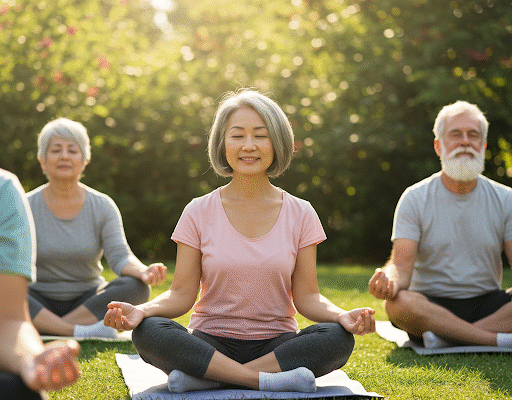Content
Meditation: A Pathway to Senior Well-being
Meditation, an ancient practice involving training the mind to focus and redirect thoughts, offers a multitude of benefits for seniors. It’s more than just sitting quietly; it’s about cultivating a state of mental clarity, emotional stability, and inner peace. Let’s explore how meditation can specifically contribute to the well-being of older adults.Reducing Stress and Anxiety
Stress and anxiety can be significant challenges for seniors, often stemming from factors like health concerns, financial worries, loneliness, or the loss of loved ones. Meditation techniques, such as mindfulness meditation, can help seniors become more aware of their thoughts and feelings without judgment. This awareness allows them to observe anxious thoughts without getting carried away by them, reducing their intensity and impact. Regular practice can lead to a calmer, more balanced emotional state.Studies have shown that mindfulness meditation can significantly reduce anxiety and stress levels in older adults. Participants who engaged in regular meditation reported improved mood and a greater sense of control over their emotions.
Improving Sleep Quality
Sleep disturbances are common among seniors. Insomnia, frequent awakenings, and poor sleep quality can negatively impact physical and mental health. Meditation can promote relaxation and quiet the mental chatter that often keeps seniors awake at night. By practicing meditation before bed, seniors can calm their minds, release tension, and prepare their bodies for a restful night’s sleep. Techniques like body scan meditation, where one focuses on different parts of the body, can be particularly helpful in releasing physical tension that might be contributing to sleep problems.Managing Pain
Chronic pain is a prevalent issue among seniors, often associated with conditions like arthritis, neuropathy, or back pain. While meditation is not a substitute for medical treatment, it can be a valuable tool for managing pain perception. Meditation can help seniors change their relationship with pain by focusing their attention elsewhere and reducing the emotional distress associated with it. Mindfulness meditation, in particular, can help seniors accept their pain without resistance, which can paradoxically reduce its intensity.Enhancing Cognitive Function
Cognitive decline is a major concern for many seniors. While aging can naturally lead to some cognitive changes, meditation has been shown to have positive effects on brain health. Studies suggest that regular meditation can improve attention, memory, and cognitive processing speed. Meditation may also increase gray matter in the brain, particularly in areas associated with attention and emotional regulation. By strengthening these areas, meditation can help seniors maintain cognitive function and reduce their risk of cognitive decline.Combating Loneliness and Isolation
Loneliness and social isolation are significant issues for many seniors, particularly those who live alone or have limited mobility. Meditation can help seniors cultivate a sense of inner connection and reduce feelings of isolation. By focusing on the present moment and cultivating self-compassion, seniors can develop a stronger sense of self-worth and resilience. Furthermore, group meditation sessions can provide opportunities for social interaction and connection, further combating loneliness.Promoting Emotional Well-being
Meditation can promote emotional well-being in several ways. It can help seniors cultivate positive emotions such as gratitude, joy, and compassion. By focusing on positive thoughts and feelings, seniors can shift their perspective and experience greater overall happiness. Meditation can also help seniors develop self-compassion, which is the ability to treat themselves with kindness and understanding, especially during difficult times. This self-compassion can be particularly helpful for seniors dealing with age-related challenges.Improving Physical Health
While meditation primarily focuses on mental and emotional well-being, it can also have positive effects on physical health. Meditation has been shown to lower blood pressure, reduce heart rate, and improve immune function. By reducing stress and promoting relaxation, meditation can help seniors manage chronic health conditions and improve their overall physical health. Furthermore, the increased sense of well-being that comes with regular meditation can motivate seniors to adopt healthier lifestyle habits, such as regular exercise and a balanced diet.Types of Meditation for Seniors
There are various types of meditation, and the best approach for seniors will depend on their individual preferences and needs. Here are a few popular options:- Mindfulness Meditation: This involves focusing on the present moment without judgment, paying attention to your breath, bodily sensations, thoughts, and feelings.
- Loving-Kindness Meditation: This involves cultivating feelings of love, compassion, and kindness towards yourself and others.
- Guided Meditation: This involves listening to a guided audio recording that leads you through a meditation practice.
- Transcendental Meditation: This involves using a mantra to quiet the mind and promote relaxation.
- Yoga and Tai Chi: These practices combine physical movement with meditation and breathwork, offering both physical and mental benefits.
Starting a Meditation Practice
Starting a meditation practice can be simple and accessible, even for seniors with limited mobility or experience. Here are a few tips:- Find a quiet space: Choose a quiet and comfortable place where you won’t be disturbed.
- Start small: Begin with just a few minutes of meditation each day and gradually increase the duration as you become more comfortable.
- Be patient: It takes time and practice to develop a meditation habit. Don’t get discouraged if your mind wanders. Just gently redirect your attention back to your breath or chosen focus.
- Use resources: There are many free apps, websites, and books that can guide you through meditation practices.
- Join a group: Consider joining a local meditation group or online community to connect with others and receive support.
It’s always a good idea to consult with a healthcare professional before starting any new exercise or meditation program, especially if you have underlying health conditions. They can help you determine if meditation is right for you and provide guidance on safe and effective practices.
Overcoming Challenges
Seniors may face certain challenges when starting a meditation practice. These might include:- Physical limitations: Seniors with physical limitations may find it difficult to sit comfortably for extended periods. In these cases, meditation can be practiced in a chair or lying down.
- Difficulty focusing: A wandering mind is a common experience for everyone, especially beginners. With practice, the ability to focus will improve.
- Skepticism: Some seniors may be skeptical about the benefits of meditation. It’s important to approach the practice with an open mind and give it a fair try.
- Lack of motivation: It can be challenging to maintain a meditation practice over time. Setting realistic goals and finding a support system can help.
Resources and Support
Numerous resources are available to support seniors in their meditation journey:- Online Meditation Apps: Apps like Headspace, Calm, and Insight Timer offer guided meditations specifically designed for seniors.
- Local Community Centers: Many community centers offer meditation classes or groups for seniors.
- Senior Centers: Senior centers often provide programs and activities that promote well-being, including meditation.
- Hospitals and Clinics: Some hospitals and clinics offer mindfulness-based stress reduction (MBSR) programs, which teach meditation techniques.
- Books and Websites: Numerous books and websites provide information and guidance on meditation.









